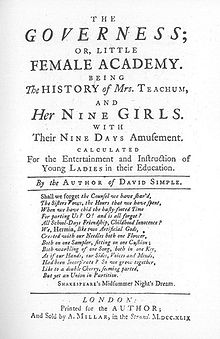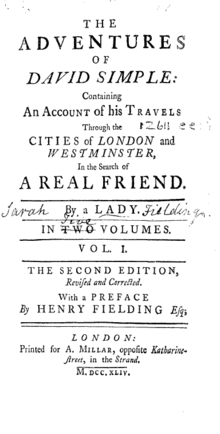- Sarah Fielding
-
Sarah Fielding (8 November 1710 – 9 April 1768) was a British author and sister of the novelist Henry Fielding. She was the author of The Governess, or The Little Female Academy (1749), which was the first novel in English written especially for children (children's literature), and had earlier achieved success with her novel The Adventures of David Simple (1744).[1]
Contents
Childhood
Henry and Ursula, and her younger siblings were Anne, Beatrice, and Edmund. Sarah's father, Edmund Feilding, the third son of John Feilding, was a military officer and relative of the Earls of Denbigh (his father, John, was the youngest son of the 3rd Earl). Although Edmund spelled his last name "Feilding" as often as "Fielding," both Henry and Sarah spelled the name "Fielding." When asked by an Earl of Denbigh why, Henry Fielding's son said, "I cannot tell, my Lord, except it be that my branch of the family were the first that knew how to spell" (Battestin 7-8). Sarah's mother, Sarah Gould, was the daughter of Sir Henry Gould, a judge on the King's Bench who had been reappointed to the Queen's Bench, and Sarah Davidge Gould. This descent is important for understanding the early life and education of Edmund Feilding's children.
Edmund left the care of his children to his wife's mother, Sarah Davidge Gould, while he built his career in London. The children grew up in her home in Glastonbury and their paternal grandfather's house in East Stour (John Feilding being a latitudinarian Cambridge-educated parish priest with three livings and who had been considered for a bishopric in Ireland) (Battestin 10). Henry was sent to Eton, but all of the daughters were sent to Mary Rookes's boarding school in Salisbury.
When Edmund's first wife (Sarah's mother) died in 1718, Edmund married Anne Rapha, a Roman Catholic widow, who brought with her several children, and later bore Edmund a son and half-brother for Henry and Sarah, the future reformer John Fielding. Sarah Davidge Gould and Sir Henry Gould (Sarah's maternal grandparents) had fallen out with Edmund prior to children's mother's death, and Lady Gould was extremely displeased with Edmund's second marriage, and Anne Rapha Fielding was the subject of much anti-Catholic sentiment from the elder generation of the family. Lady Gould was so set against Anne and her enlargement to the family that in 1721, she sued for custody of the children and ownership of the family house in East Stour. She eventually won, leaving the children unable to see their father for years.
Writing career
In the 1740s, Sarah Fielding moved to London, sometimes living with her sisters and sometimes with her brother Henry and his family. The women of the family lacked sufficient money for a dowry, and consequently none married. Even when Lady Gould died in 1733, there was little money for the children.
Sarah turned to writing to make a living. While she lived with her brother and acted as his housekeeper, she began to write. In 1742, Henry Fielding published Joseph Andrews, and Sarah is often credited with having written the letter from Leonora to Horatio (two of the characters in the book). In 1743, Fielding published his Miscellanies (containing his life of Jonathan Wild), and Sarah may have written its narrative of the life of Anne Boleyn.
In 1744, Sarah published a novel, The Adventures of David Simple. As was the habit, it was published anonymously. The novel was quite successful and gathered praise from contemporaries, including the publisher and novelist Samuel Richardson. Richardson, who was himself the target of Henry Fielding's satire, said that he thought Sarah and Henry were possessed of equal gifts of writing. David Simple went into a second edition within ten weeks, and was translated into French and German. The title pages to Sarah Fielding's novels often carried the advertisement that they were written by "the author of David Simple". The novel was sufficiently popular that Sarah wrote Familiar Letters between the Principal Characters in David Simple as an epistolary furtherance to the novel in 1747. In 1753, she wrote a sequel to David Simple entitled David Simple: Volume the Last.
David Simple was one of the earliest sentimental novels, featuring a wayfaring hero in search of true friendship who triumphs by good nature and moral strength. He finds happiness in marriage and a rural, bucolic life, away from the corruptions of the city. David Simple is an analog, in a sense, to the figure of Heartsfree, in Henry Fielding's Jonathan Wild and Squire Allworthy in his Tom Jones. However, he also shares characteristics with other sentimental figures who find their peace only with escape from corruption and the harmony of a new Utopia. In her Volume the Last, however, Sarah's fiction, like Henry's, is darker and shows less of a faith in the triumph of goodness in the face of a corrosive, immoral world.
 Title page from The Governess, or The Little Female Academy (1749), by Sarah Fielding, the first full-length novel written for children.
Title page from The Governess, or The Little Female Academy (1749), by Sarah Fielding, the first full-length novel written for children.
Fielding also wrote three other novels with original stories. The most significant of these was The Governess, or The Little Female Academy in 1749, which is the first novel in English written especially for children (children's literature). In addition, she wrote The History of the Countess of Dellwyn in 1759, and The History of Ophelia in 1760.
As a critic, Sarah Fielding wrote Remarks on Clarissa in 1749, concerning the novel Clarissa by Samuel Richardson. As a biographer, she wrote The Lives of Cleopatra and Octavia in 1757, a history, written from Greek and Roman sources, on the lives of Cleopatra and Octavia, two famous women from Roman times. As a translator she produced Xenophon's Memoirs of Socrates, with the Defense of Socrates Before His Judges in 1762, a work by the Ancient Greek writer and soldier Xenophon concerning the philosopher Socrates.
Final years
Sarah's sisters died between 1750 and 1751, and Henry died in 1754. Sarah retired from London and moved to a small house just outside Bath. The famous philanthropist Ralph Allen and the similarly famous Elizabeth Montagu (a member of the Blue Stockings Society) gave her some financial aid. In around 1767, the novelist Sarah Scott, sister of Elizabeth Montagu, invited Sarah Fielding to come and live with her in a female utopian community, an attempt to create the utopia described in Millenium Hall, but Sarah declined the invitation. Sarah Fielding died in 1768. There is a memorial plaque to her on the west porch of Bath Abbey.
List of works
- 1744 - The Adventures of David Simple
- 1747 - Familiar Letters between the Principal Characters in David Simple
- 1749 - The Governess, or The Little Female Academy
- 1749 - Remarks on Clarissa
- 1753 - David Simple: Volume the Last
- 1754 - The Cry: A New Dramatic Fable (with Jane Collier)
- 1757 - The Lives of Cleopatra and Octavia
- 1759 - The History of the Countess of Dellwyn
- 1761 - The History of Ophelia
- 1762 - Xenophon's Memoirs of Socrates, with the Defense of Socrates Before His Judges
Notes
- ^ "Sarah Fielding". Encyclopedia Britannica Online. Retrieved 19 December 2009.
References
- Chawton House Women's Writing Entry
- Battestin, Martin C. and Ruthe R. Battestin. Henry Fielding: A Life. New York: Routledge, 1989.
Further reading
- Barchas, Janine. "Sarah Fielding's Dashing Style and Eighteenth-Century Print Culture". ELH 63.3 (1996): 633-56.
- Battestin, Martin C. and Clive T. Probyn, eds. The Correspondence of Henry and Sarah Fielding. Oxford: Oxford University Press, 1993.
- Battestin, Martin C. "Henry Fielding, Sarah Fielding, and 'the Dreadful Sin of Incest'". Novel 13.1 (1979): 6-18.
- Bree, Linda. Sarah Fielding. New York: Twayne Publishers, 1996.
- Downs-Miers, Deborah. "Spring the Trap: Subtexts and Subversions". Fetter'd or Free?: British Women Novelists, 1670–1815. Eds. Mary Anne Schofield and Cecilia Macheski. Athens: Ohio University Press, 1986.
- Eaves, T. C. Duncan and Ben D. Kimpel. Samuel Richardson: A Biography. Oxford: Oxford University Press, 1971.
- Johnson, Christopher D. "Introduction". The Lives of Cleopatra and Octavia. London: Associated University Presses, 1994.
- Needham, Arnold E. The Life and Works of Sarah Fielding. 1943.
- Nussbaum, Felicity A. The Limits of the Human: Fictions of Anomaly, Race, and Gender in the Long Eighteenth Century. Cambridge: Cambridge University Press, 2003.
- Rizzo, Betty. Companions Without Vows: Relationships Among Eighteenth-Century British Women. Athens: University of Georgia Press, 1994.
- Sabor, Peter. "Richardson, Henry Fielding, and Sarah Fielding". The Cambridge Companion to English Literature 1740-1830. Eds. Thomas Keymer and Jon Mee. Cambridge: Cambridge University Press, 2004.
- Schellenberg, Betty A. The Professionalization of Women Writers in Eighteenth-Century Britain. Cambridge: Cambridge University Press, 2005.
- Schofield, Mary Anne. Masking and Unmasking the Female Mind. University of Delaware Press, 1990.
- Skinner, Gillian. "'The Price of a Tear': Economic Sense and Sensibility in Sarah Fielding's David Simple". Literature and History 3rd series. 1.1 (1992): 16–28.
- Spencer, Jane. The Rise of the Woman Novelist: From Aphra Behn to Jane Austen. Oxford: Basil Blackwell, 1986.
- Spender, Dale. Mothers of the Novel. London: Pandora, 1986.
- Stockstill, Ashley. "Better Homes and Gardens: The Fairy World(s) of Sarah Fielding and Sarah Scott". Feminist Studies in English Literature 6.2 (1998): 137-58.
- Terry, Richard. "David Simple and the Fallacy of Friendship". Studies in English Literature, 1500-1900. 44.3 (2004): 525-44.
- Todd, Janet. The Sign of Angellica: Women, Writing and Fiction, 1660–1800. New York: Columbia University Press, 1989.
- Woodward, Carolyn. "Sarah Fielding's Self-Destructing Utopia: The Adventures of David Simple". Living by the Pen: Early British Women Writers. Ed. Dale Spender. New York: Teachers College Press, 1992.
External links
- Works by Sarah Fielding at Project Gutenberg
- Clive Probyn (2004). "Fielding, Sarah (1710–1768)". Oxford Dictionary of National Biography. Oxford University Press. http://www.oxforddnb.com/view/article/9405. Retrieved 2006-11-11.
Eighteenth-century British children's literature Categories:- 1710 births
- 1768 deaths
- English novelists
- People from North Dorset (district)
- 18th-century British children's literature
- British women writers
- Women novelists
- Writers from London
- 18th-century women writers
Wikimedia Foundation. 2010.

